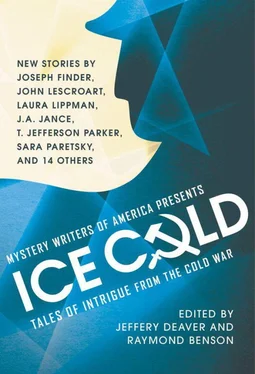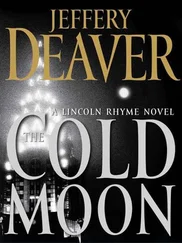“Obviously,” says Grimmenkauf, “to avoid the risk of his packages being inspected by the American military.”
He’s right. It is obvious. Safety. Anonymity. And there I would have left it. But something is beating at me; something feels odd. No cost. Overnight. Ship and receive for free. Lower middle-class Army kid from the wrong side of Chicago, out hustling the world. The transactional personality. The trader. Wouldn’t he gravitate to the most profitable method? Figure out an arrangement, as he apparently had with Anna? Wouldn’t he find a way to make a deal?
On a hunch, I checked with authorities on the base, with whom we West Germans have a good working relationship and who saw no reason not to cooperate, and it turned out that Colonel Miller was shipping plenty of goods through the American PX. He clearly felt a high degree of safety and confidentiality in using the American PX. Clearly he had his own contacts there, partners he could trust, cut in on some profits, and thereby blackmail and control.
A little digging and prodding, and we get the full picture: Pharmaceuticals. Untracked duty-free timepieces. African pelts. Monkey brains. Rhinoceros testicles. Freeze-dried poppy seeds. Corporal Miller is a one-man transfer station. A one-man import-export center. We could bust him on any of these, of course. But it will be another slap on the wrist; a tortuous legal process. We want him, we need him, for Anna.
So—a robust use and enjoyment of the American PX advantages.
Except, maybe, if you’re sending something you really can’t risk. Only then do you turn to the official, anonymous, utterly reliable German postal system.
Anonymous, that is, until we persuade the postal service for an inspection exemption. Circumventing privacy rules with the reluctant assistance of none other than my brother Siggy, a long-standing, dutiful postal employee, who nervously, grudgingly, locates the appropriate confidential shipping waybills for us. A little family connection. A little back-scratching. A little arm-twisting. A little East German tactics on my part, I guess. My nod to my partner of the moment, Herr Grimmenkauf.
We find only a couple of receipts. The bare minimum disclosed on them. Including the shipping date.
A package sent the morning of November 10th, 9 a.m. Contents undisclosed, as is permitted. But the date stamp is clear.
The morning after the Wall fell. The morning after the partying. The morning after Anna Hoppler was murdered. Just as the post office opened.
Giving me a thin hope, the sliver of a sense, that Chad didn’t hide the murder weapon, didn’t bury it, or throw it in the river.
That he shipped it.
Remember I said it was a joke, this East West partnership of Grimmenkauf and me? Well, the joke now accelerates. Gets straight to the punch line. Because the German police—as if to have the full belly laugh out of this—happily pay to put us both on a flight from Berlin to London to Los Angeles, California. To Grimmenkauf’s fabled, beloved America. To Los Angeles, no less, the belly of the beast. To an address in West Hollywood, where some particularly large cartons sent by Corporal Miller have made their way before us.
Grimmenkauf in Los Angeles. The trenchcoat, the squat form, hunched against the unfamiliar sunshine, the gleam off buildings. Squinting out the rental car’s passenger side window as we wind our way up into the Hollywood Hills. Looking at the gleaming, buffed, immaculate ostentation. Disgusted, dreamily, fascinated, silent, as if he has arrived in heaven and hell simultaneously.
I am fully expecting one of Grimmenkauf’s anticapitalist diatribes. Look how precarious, Herr Bunder. Look where they build, on outcroppings of rock, on shifting land. It is irresponsible. Arrogant. A statement of impermanence. Beautiful homes built on the backs of Mexican laborers. Who tend their green lawns and picture-book shrubbery for them. These hills themselves like a Hollywood set.
Of course, these are my own observations. Grimmenkauf never utters a word. Are his anti-American views infecting me? Or perhaps, convincing me?
We cruise now along Mulholland Drive—a street name I recognize from the noir movies with Susie—but on this Los Angeles morning, sunshine bright and bouncing against the rental car sheet metal, against the bright clean road bed. It is the polar opposite of East Berlin, I’m thinking. In weather, appearance, attitude, in past and history (or lack thereof), in atmosphere both literal and metaphoric, in every possible way, its opposite. Grimmenkauf stares out. Blue eyes soaking it in.
The woman’s name is Elaine Markham. The home is beautiful, of course. A big glistening swimming pool, overlooking the Los Angeles valley. Bright colorful abstract paintings on the wall. Ms. Markham greets us in her red tracksuit. Early forties. Bronzed. Gleaming smile. Plastic surgery on her upturned nose, her high cheeks, and her ample and equally upturned breasts. A Hollywood liberal. I once thought that Grimmenkauf and I were opposites, but I have been significantly trumped—as I see polished, sunny Elaine Markham and wrinkled, trenchcoated Grimmenkauf regard each other—from across the globe, from across the universe, divergent species passing unexpectedly close.
We see it on display in the bright living room at the same time, Grimmenkauf and I. Presented beautifully on a pedestal, with a pin light on it. She sees us both looking, and smiles.
“That’s right,” she says. “A piece of the Berlin Wall. To us, it’s so symbolic,” she says, eyes glistening, still visibly moved by this recent triumph of the human spirit. “Such a powerful political moment. Such a statement of freedom.” She looks at it with awe. We step closer to it.
It is amusing, entertaining, to see a piece of the wall we have lived with, dull obtrusive brick, part of our lives like roadway or culvert or drainage pipe or curb, enshrined like this. Worshipped. Like bowing down to a roll of toilet paper.
“This is what Corporal Miller shipped to you?” I ask.
“Yes. Isn’t it wonderful?”
Chad the black marketeer.
Another product. Another sudden lucky way to make a buck.
Grimmenkauf then asks her, in his hesitant English: “He sent you more pieces, yes?”
“Oh yes,” she says proudly.
“We can see?”
“Sure.”
“Each one you will sell?”
She looks offended. “Fund-raising. To promote the cause of freedom.”
“How much for a brick?”
“Each goes for $3,000 dollars.”
We stare at her blankly—both of us imagining what $3,000 dollars U.S. would mean in our pay envelopes and in our lives.
“It goes to charity,” she explains. “A charity in West Germany to benefit sick and disabled East German children, called Liberation.”
Liberating you from your cash, I thought. Grimmenkauf and I both knew who we would find behind said “charity.” We knew its founder and sole proprietor.
Grimmenkauf takes the other bricks out of the big open cartons in Elaine Markham’s huge walk-in storage closet.
Ordinary bricks, though most with splashes of vibrant celebratory spray-painted color, all of them still wrapped fully, carefully, in tissue paper.
He finally comes to—unwraps—the last brick in the bottom of one of the cartons.
One side of the brick is completely covered in red.
Merely more paint, graffiti, to the untrained eye. The running joyful color of protest, the bright vibrant evidence of the human spirit.
But to Grimmenkauf and myself, it is obvious.
The West German lab will confirm the blood type. I will guide Grimmenkauf through the new process of DNA matching.
A blunt instrument.
Symbol of freedom.
Though Corporal Miller’s has finally come to an end.
Читать дальше












